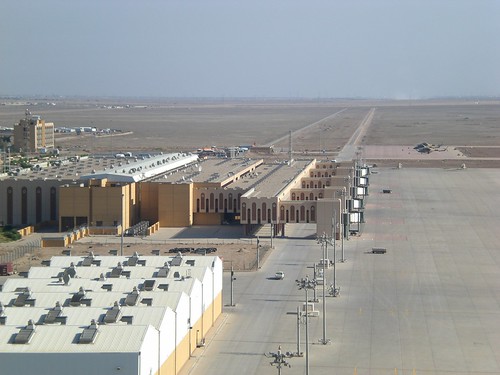The received wisdom within the British Government and the higher echelons of the Ministry of Defence’s Main Building is that the situation in Basra is safer and better since Charge of the Knights, the Iraqi led operation earlier this year. Given the situation on the ground, the argument goes, it makes sense that British Armed Forces should depart soon.
This argument is seductive and credible – but not without risk. Senior Ministers who have recently returned from Basra, like Douglas Alexander, have argued that it makes sense to leave now. In theatre the discussion is more nuanced and centres on the progress of each Military Transition Team (MiTT) in Basra and the surrounding areas. If one was to characterise the general feeling then it would be something along the lines of: ‘We have done our best but now it is up to the Iraqis’.
But should we really be thinking of leaving Basra so soon?
One of the more curious nuggets from conversations I had in Basra when I visited recently was the baseline for progress used by most people. Few talked about what happened in 2003, 2005 or even in 2007. In many ways these dates were meaningless and harked back to an altogether different period of history. Instead the reference point for British soldiers, NGO representatives, Baswaris and even ‘our man’ in the consulate was 7 months ago in March and April, when the Iraqi Army (with support from the American military and to a lesser extent British forces) turned south to Basra and fought running street battles with Jaish al-Mahdi (JAM), a paramilitary force created by Muqtada al-Sadr. The Iraqi Army successfully flushed the militia from the city, and JAM commanders slunk back into Iran (from where they had come) while others decided enough was enough and melted into everyday city life.
But consider that time frame for a moment longer. Only 7 months since the grip of instability and chaos was prised out of Muqtada al-Sadr hands and a relatively benign security environment was created allowing DFID and others to get out and onto the ground – not much in the grand scheme of things, even if progress has undoubtedly been made; soon Basra International Airport will open fully (see photo below).

But is the British Government going to make a similar mistake to the one it made in 2003? Five years ago Tony Blair diverted attention from the campaign in Afghanistan and focused on Iraq, ostensibly in a bid to find WMDs, but in reality to support the Bush administration. Could we be making the same mistake again? Could the internal pressure (inside the new and old US administration) to focus on Afghanistan lead the British Government to cut its losses in Basra and change tack?
The British have been in Iraq for 5 years. 176 British men and women have died. Only in the last 7 months have we been able to make real progress on the ground. No one doubts that Afghanistan is a mess. But it would be a disaster to leave Basra without first ensuring the ordinary Baswaris, the Provincial Government, Iraqi Army and the Police have the capacity and capabilities needed to ensure today’s progress is not wasted on the political expediency of tomorrow.



